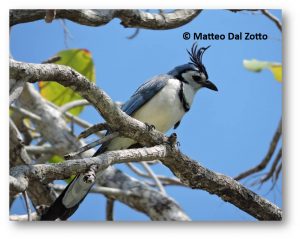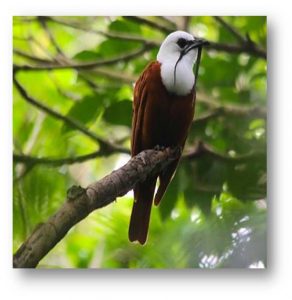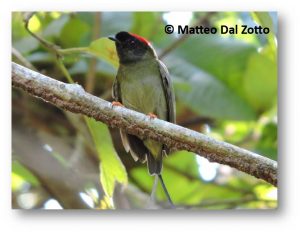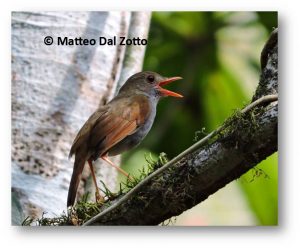Thanks to the presence of the “Italy-Costa Rica” research station , located in the forests of the Karen Mogensen Reserve, a study of the tropical fauna is currently underway , aimed at relating biodiversity to climate change .
Webcam Images andLive Weather Data from the Meteoclimatic Biological Station.
The Climbio project – funded by the Fondazione Cassa di Risparmio di Modena and promoted by the Department of Life Sciences of the University of Modena and Reggio Emilia in collaboration with the Geophysical Observatory (Unimore), the Associazione Foreste per Sempre ODV and the Asociación Ecológica Paquera, Lepanto y Cóbano – focuses on the study of avifauna, an important indicator of global climate change .

The project includes an informative part , already undertaken in schools in Costa Rica and, now, in Italy. An educational path has been created for schools of all levels , while for a wider public an exhibition is being created inside the Museum of Zoology (Via Università 4, Modena). The aim is to discover tropical biodiversity, its importance and the effects of climate change on it.
059/2056561
Facebook: https://www.facebook.com/Climbio-Project-Climate-Biodiversity
Download the CLIMBIO poster (2.797 kb)
Video presentation of the Climbio project – Climate Biodiversity
Video images of camera traps positioned during the research phases of the project
For further information:

The CLIMBIO project is aimed in particular at the study of the ornithofauna of the Karen Mogensen Reserve, located on the Pacific side of Costa Rica. This process, promoted by the Department of Life Sciences of the University of Modena and Reggio Emilia, is headed by Prof. Aurora Pederzoli and partners include the Foreste per Sempre ODV and ASEPALECO (Asociación Ecológica Paquera, Lepanto y Cóbano) Associations.
.The project includes field research and dissemination of results with awareness-raising work on the issue of climate change and biodiversity conservation. The field work is being carried out at the Biological and Meteorological-Climatic Station “Italia Costa Rica”, partly built thanks to funding from Modena companies and dedicated to the memory of Augusta Bellei from Fiorano. This research station is located in the Karen Mogensen Reserve, an area created and expanded over more than twenty years thanks to a partnership between Italian and Costa Rican bodies, including the Foreste per Sempre Association, GEV Modena, the University of Modena and Reggio Emilia, the Province of Modena and ASEPALECO. The study, the first carried out within the recently inaugurated research station, aims to evaluate the effects ofclimate change on tropical ornithofauna, addressing a known problem that currently has no certain answers. Several studies support the possibility of using birds as biological indicators of ongoing climate change. In fact, due to their very active metabolism and high vagility, these organisms are very sensitive to weather and climate variations, which influence in various ways the relevant phenomena of their vital development.
The project consists of an initial phase of framing the Reserve and collecting data. In practice, some species are identified that can act as bioindicators within a broader monitoring plan that will lead to the complete mapping of the biodiversity of the protected area.

The meteorological data will be collected using recently installed instruments and sent to the Geophysical Observatory of the Enzo Ferrari Engineering Department. A second phase, following the fieldwork and the analytical phase, will involve communicating the results to the social fabric, mainly in the Modena area and also in the Costa Rican area bordering the Karen Reserve. During a first field expedition – carried out between February and March 2016 – the ongoing project was presented to a local high school as well as to a team of professionals working in the area. The next steps will include thecontinuation of this dissemination activity on site, the involvement of young people in eco-volunteering activities and the realization of a twinning between Costa Rican and Modenese high schools. We are convinced that the knowledge acquired during the project must be transferred from the strictly scientific field to increasingly larger portions of society. Only by following this path can we truly hope for the growth of an awareness and sensitivity towards the issues of respect for the environment and the importance of healthy cooperation between countries of the world. The path of knowledge is also essential for the protection of human health, which today is increasingly dependent on global climate change. The growth of interest in the environment and its care can progressively lead to greater attention to environmental hygiene and therefore to the promotion of human health, with obvious benefits from the point of view of the quality of life, the psychophysical well-being of many people, as well as savings in terms of economic management of local health facilities.

The CLIMBIO project involves, as partners, the Museum of Zoology and Comparative Anatomy of the University of Modena and Reggio Emilia, the Geophysical Observatory (Unimore), the National Institute of Biodiversity of Costa Rica, the Salse di Nirano Reserve (Municipality of Fiorano Modenese), the Natural History Museum of Marano sul Panaro and the Naturalistic Museum “Ferruccio Minghelli” of Montecuccolo (Pavullo).
Aquatic avifauna and climate change: a thirty-year study in Modena ( pdf 6,297 kb)
Local effects of climate change: the case study of Modena (pdf 8,158 kb)
The article on the research at Karen Station by Team Climbio has been published in the international scientific journal ZooKeys
Matteo Dal Zotto – Foreste per Sempre Association, Modena, Italy – University of Modena and Reggio Emilia, Modena, Italy; Dario Sonetti – Foreste per Sempre Association, Modena, Italy – University of Modena and Reggio Emilia, Modena, Italy; Giuseppe Romeo – Foreste per Sempre Association, Modena, Italy – Consortium for the Interuniversity Center of Marine Biology and Applied Ecology, Livorno, Italy; Aurora Pederzoli – University of Modena and Reggio Emilia, Modena, Italy; Luis A. Mena Aguilar – Paquera Ecological Association, Jicaral, Costa Rica


